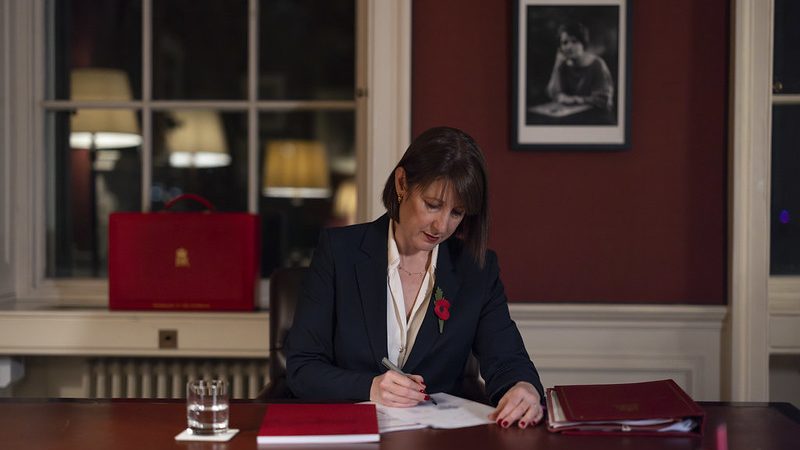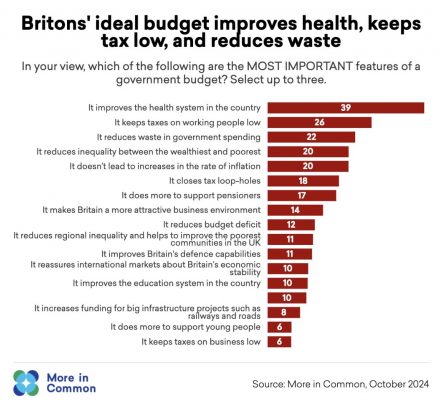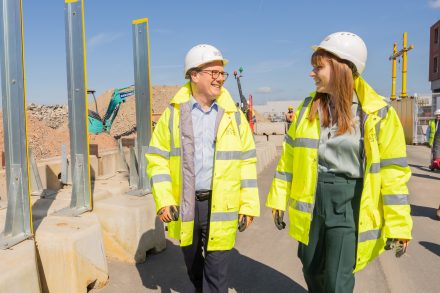
The Chancellor Rachel Reeves’ Budget today gives one of the biggest signs yet of Labour’s electoral strategy over the coming years.
It also comes hot on the heels of a Downing Street staffing shakeup intended to give the governnment more political edge.
Here are what some of the key policies appear to be aimed at, and what they signal about Labour’s political priorities:
READ MORE: Live updates, key points and stream on the 2024 Budget and reaction
Prioritise the NHS as voters’ key test of Labour’s success
The NHS has been key to Labour messaging around the Budget. Reeves today announced a £22.6bn increase in day-to-day health spending and £3.1bn in capital spending, calling it the largest investment since 2010 (outside Covid).
She said funding and reform would bring down waiting lists and “move towards” waiting lists being no longer than 18 weeks and delivering on manifesto pledges of 40,000 appointments a week.
Reeves notably chose this week to visit a hospital on Monday too, and told journalists: “We will be known as the government that took the NHS from its worst crisis in its history, got it back on its feet again and made it fit for the bright future ahead of it.”
Labour has ploughed a huge amount into public services, with £70bn extra spending a year over the next five years, funded through measures including £36bn in tax hikes and £32bn in borrowing.
It could have chosen to spread cash more evenly among government departments, though – and the level of focus on the NHS signals senior strategists think it’s on healthcare where most voters will either most want progress or most notice a lack of it in the coming years.
Recent polling seems to vindicate that idea politically:

While improving education isn’t that high on that poll at least, the £6.7bn pledged for education capital projects could reflect having the most state-educated cabinet ever. It could also reflect a sense new or repaired school buildings will be a highly visible signal to many parents that Labour is fixing the public realm, with New Labour similarly investing significantly in school buildings.
Extra funding for special educational needs support budgets, devastated in recent years, will also help not just unitary authorities in deprived Labour-leaning urban areas, but also many similarly cash-strapped county councils in wealthier and poorer areas alike ahead of local elections next year.
Note how high reducing “waste in government spending” is too on that voter priority list – that may partly explain measures announced like a new covid corruption commissioner and chair of the new Office for Value for Money. There was also a promise of a “new approach to public service reform” alongside cash. There is also a crackdown on fraud in our welfare system”.
The latter is unlikely to go down well on the left given how much the Conservatives whipped up public scepticism about benefit claimants – which is probably why Reeves hastily said fraud is “often the work of criminal gangs”.
A left agenda for working people – and employers will have to lump it
Tough questions from journalists over the definition of ‘working people’ may have caused ministers headaches in recent weeks, and Labour may have ditched some of its more radical policies in recent years, but make no mistake – making workers substantially better off remains absolutely central to Labour’s agenda.
No. 10 chief of staff Morgan McSweeney is said to be a strong believer it’s crucial to Labour’s broad election-winning coalition. Joe Biden’s troubles in the US have also cemented the sense economic growth is not enough – as both Starmer and Reeves said this week, “change must be felt”. There’s a reason that most of the New Deal – now rebranded Make Work Pay – has survived the cull of more contentious policies in recent years.
So it’s no surprise it’s central to Budget messaging:
Next week, @RachelReevesMP will set out how Labour will fix the foundations of our economy to deliver the change we promised. pic.twitter.com/a97n7GANTx
— The Labour Party (@UKLabour) October 26, 2024
It’s no surprise that Labour has stuck to its pledge of no national insurance or income tax hikes for workers, and vowed not to extend the freeze on tax thresholds, despite speculation about the latter – and despite the taxes being such a large potential source of much-needed revenue.
It’s no surprise Labour has significantly hiked the minimum and living wages, too: Reeves confirmed that the living wage will rise by 6.7 percent,
Given Reeves’ need for revenue to avoid the Tories’ real-terms spending cuts, she’s instead opted for significant hikes to employment national insurance (up 1.2 percentage points to 15%) and a lower threshold it’s paid at, plus a hike to capital gains tax (the lower rate will rise from 10% to 18%; the higher rate from 20% to 24%).
That signals a Labour party much more willing to face down intense business lobbying than many of Keir Starmer’s critics on the left might think – and than Starmer and Reeves let on themselves in the run-up to the election.
There may be a political battle to stop the employer NI hikes undermining its messaging though, as Bloomberg’s Alex Wickham notes:
IFS says working people will pay for Reeves’ tax rises — essentially accusing her of breaking Labour’s manifesto pic.twitter.com/tPLkGh4F7H
— Alex Wickham (@alexwickham) October 30, 2024
Perhaps sensitive to how many small (as opposed to large) businesses owners there are in Britain though, and how much many voters care about their high streets, Reeves notably raised the NI allowance for employers, taking 850,000 organisations out of paying it altogether.
Meanwhile the 40% relief on business rates for retail, leisure and hospitality will be extended, and small business multiplier be frozen. Reeves also pledged tougher action on shoplifting, which will make many shopkeepers and retail workers cheer.
Hammer home Tory blame game for floating voters
Political anoraks may tire of Labour’s relentless repetition of attacks on the Tories for their legacy, but there’s an old saying that once journalists get bored of a message, it’s probably only just starting to cut through.
Senior figures know their best bet for getting the public and media to acquiesce in the £40bn Reeves confirmed in controversial tax hikes – to fund public services crying out for investment – is to lay the blame squarely on the Tories.
Hence Reeves spending the first chunk of her Budget attacking the “broken public finances” inherited, and accusing the Tories of hiding “hundreds of unfunded pressures”.
For good measure, Reeves similarly tried to buy the government some further time to fix “broken public services”, highlighting the grim state of school buildings, NHS waiting lists, pollution and prisons “overflowing”.
Rule changes and savings to reassure markets over borrowing hike
Governments rely on investors buying up bonds to fund much of their spending, and past Labour governments and Liz Truss alike have paid the price for market fears about unsustainable spending and inflation, which raises borrowing costs.
So reaassuring investors Labour can be trusted is key for Reeves, particularly when official figures suggest her revised fiscal rules will mean a £32bn-a-year hike in borrowing – one of the biggest leaps in decades.
Her new “stability rule” – imposing even tougher debt reduction targets than the Tories had on day-to-day spending, and pledging to bring it down within three years, not five – is a clear bid to do just that.
So is confirming too that Labour will implement Britain’s fiscal watchdog’s recommendations and a new Charter for Budget Responsibility.
Perhaps her 2% productivity, effiicency and savings target for each government department has the same intent – even if it won’t endear Reeves to her cabinet colleagues.
The Treasury will hope such moves help to counterbalance investor worry over Labour’s “investment rule”, which allows Labour more leeway to borrow for longer-term projects by redefining government debt.
A pitch for aspiring homeowners – as wealthy ones pay the price

Other notable pledges include £5bn on its housing plans, including £3.1bn to increase housebuilding, and funds to recruit more planners, remove more cladding and make the government’s mortgage guarantee scheme permanent for first-time buyers with low deposits.
That could reflect how important senior figures think aspiring homeowners, or recent buyers hoping to upsize, are to their electoral coalition. Age was a key factor at the last election, and the move will be welcomed by many younger voters.
The funding, and a wider boost to local government budgets, are a win for deputy PM Angela Rayner too after years of local government funding squeezes – and be welcomed by Labour councillors nationwide.
Given how many more MPs in marginal seats Labour now has in slightly better-off areas with often-higher house prices, perhaps the home ownership focus should also come as no surprise.
Reeves effectively declared war on second-homeowners as well by raising the stamp duty surcharge they pay from tomorrow – and explicitly said it could help more than 100,000 people to buy their first home or move in the next five years.
Meanwhile inheritance tax changes – often spurned by governments worried about alienating better-off older voters or the newspapers they read – could hit some wealthier homeowners hard.
That said, the voter targeting has a limit – with Reeves not extending a wider stamp duty discount that expires early next year.
Fending off Farage and the Tories on fuel, defence and pints
Pre-Budget speculation of fuel duty hikes came to nothing – as Reeves confirmed the current temporary 5p cut will endure for another year.
With low-traffic neighbourhoods under fire in recent years and newspapers regularly championing drivers, there was always a risk someone like Nigel Farage used any fuel duty hike to whip up anti-Labour sentiment.
It was a fuel tax rise that sparked the yellow-vest movement in France, sparking wider unrest and a sense among many drivers the French government didn’t represent the interest of people like them.
Similarly, a cut to draught duty lets Reeves claim there’ll be “a penny off a pint”, depriving Farage of another potential campaign given other drinks taxes are set to rise. A pledge of extra defence spending also helps shore up Labour against the Tories and right-wing press questioning, as ever, how far it can be trusted on defence.
That said, the raising of the bus fare cap, like the winter fuel cuts, could prove a continued thorn in the government’s side that Labour’s opposition left and right exploit in the weeks and months to come.
Read more of our Budget 2024 coverage:
- Live updates and stream as tax and spend policy revealed
- Labour’s Budget 2024: All the policies announced in advance
- ‘No fiscal rule is perfect. But this one means welcome investment’
- Fiscal rules: What is Reeves changing – and why does it matter?
- Bus fare cap row rumbles on as Burnham sticks to £2 cap
- Sam White: ‘Budget 2024 leaves Reeves facing nine circles of fiscal hell’
- Budget bus fare row: ‘The £2 cap was a rare policy that dramatically improves lives – it’s so cheap people talk about it’
- Budget 2024: National Minimum Wage set for record hike and Living Wage to rise 6.7%
- Budget 2024: ‘How Rachel Reeves will turn the page on the Tories’ economic illiteracy’
- ‘How Labour councils can help Starmer and Reeves deliver their growth mission’
- SHARE: If you have anything to share that we should be looking into or publishing about this story – or any other topic involving Labour– contact us (strictly anonymously if you wish) at [email protected].
- SUBSCRIBE: Sign up to LabourList’s morning email here for the best briefing on everything Labour, every weekday morning.
- DONATE: If you value our work, please donate to become one of our supporters here and help sustain and expand our coverage.
- PARTNER: If you or your organisation might be interested in partnering with us on sponsored events or content, email [email protected].




More from LabourList
Josh Simons resigns as Cabinet Office minister amid investigation
‘After years of cuts, Labour’s local government settlement begins to put things right’
‘The Sherriff of Wild Westminster: what must change in elections bill’